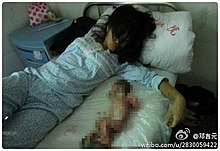Forced Abortion
A forced abortion may occur when the perpetrator causes abortion by force, threat or coercion, or by taking advantage of female's incapability to give her consent, or where she gives her consent under duress. This may also include the instances when the conduct was neither justified by medical or hospital treatment. Like forced sterilization, forced abortion may include a physical invasion of female reproductive organs.
People's Republic of China
Forced abortions associated with administration of the one-child policy have occurred in the People's Republic of China; they are a violation of Chinese law and are not official policy. They result from government pressure on local officials who, in turn, employ strong-arm tactics on pregnant mothers. On September 29, 1997, a bill was introduced in the United States Congress titled Forced Abortion Condemnation Act, that sought to "condemn those officials of the Chinese Communist Party, the government of the People's Republic of China and other persons who are involved in the enforcement of forced abortions by preventing such persons from entering or remaining in the United States". In June 2012 Feng Jianmei was forcibly made to abort her 7 month old fetus after not paying a fine for breaking the one-child policy. Her case was widely discussed on the internet in China to general revulsion after photos of the stillborn baby were posted online. A fortnight after the forced abortion she continued to be harassed by local authorities in Shanxi Province. On July 5, the European Parliament passed a resolution saying it "strongly condemns" both Feng's case specifically and forced abortions in general "especially in the context of the one-child policy."
Part of the work of the activist "barefoot lawyer" Chen Guangcheng also concerned excesses of this nature. By 2012, disagreement with forced abortion was being expressed by the public in China despite its reduced use, and repeal of the one-child policy was reportedly being discussed in some quarters for this and other reasons. Even after the shift to a two-child policy in January 2016, the practice still occurs, in 2020 reportedly intimidating the Uyghur minority. The US government imposed sanctions on officials in response.

North Korean refugees repatriated from China
Forced abortions and infanticide are used as a form of punishment in prison camps. The North Korean regime banned pregnancy in its camps in the 1980s. The People's Republic of China returns all illegal immigrants from North Korea which usually imprisons them in a short term facility. Many North Korean escapees assert that forced abortions and infanticide are common in these prisons. The majority of the prisoners held in the Chinese detention centers are women. Repatriated North Koreans are subject to forced abortions regardless of perceived crimes. North Korean police's efforts are to prevent North Korean women from having ethnically mixed children with Han Chinese men. Medical care was not provided to North Korean women who underwent forced abortions.
United Kingdom
On June 21, 2019, a UK court ordered a disabled woman to have an abortion against her will. This was subsequently overturned on appeal.
United States
Coerced abortions qualify as forced abortions in the United States. Coercion includes withholding information from the patient, hiding or restricting access to abortion providers, or pressuring a woman to obtain an abortion.
Laws surrounding forced abortions
In 2016, Michigan Governor Rick Snyder enacted two bills with the intent to end forced abortions in the state. The first bill banned coercing a woman to have an abortion, and the second bill bans coerced abortions. Eighteen states, including the fourteen that have criminalized coerced abortion, have mandated that abortion clinics and providers offer written and verbal notification advising women against receiving an abortion under coercion.
Forced abortion in sex trafficking
In a series of focus groups conducted around the United States by anti-trafficking activist Laura Lederer in 2014, over 25% of survivors of domestic sex trafficking who responded to the question reported that they had been forced to have an abortion.
See also
- Feticide
- Sex-selective abortion
- Childless Hundred Days